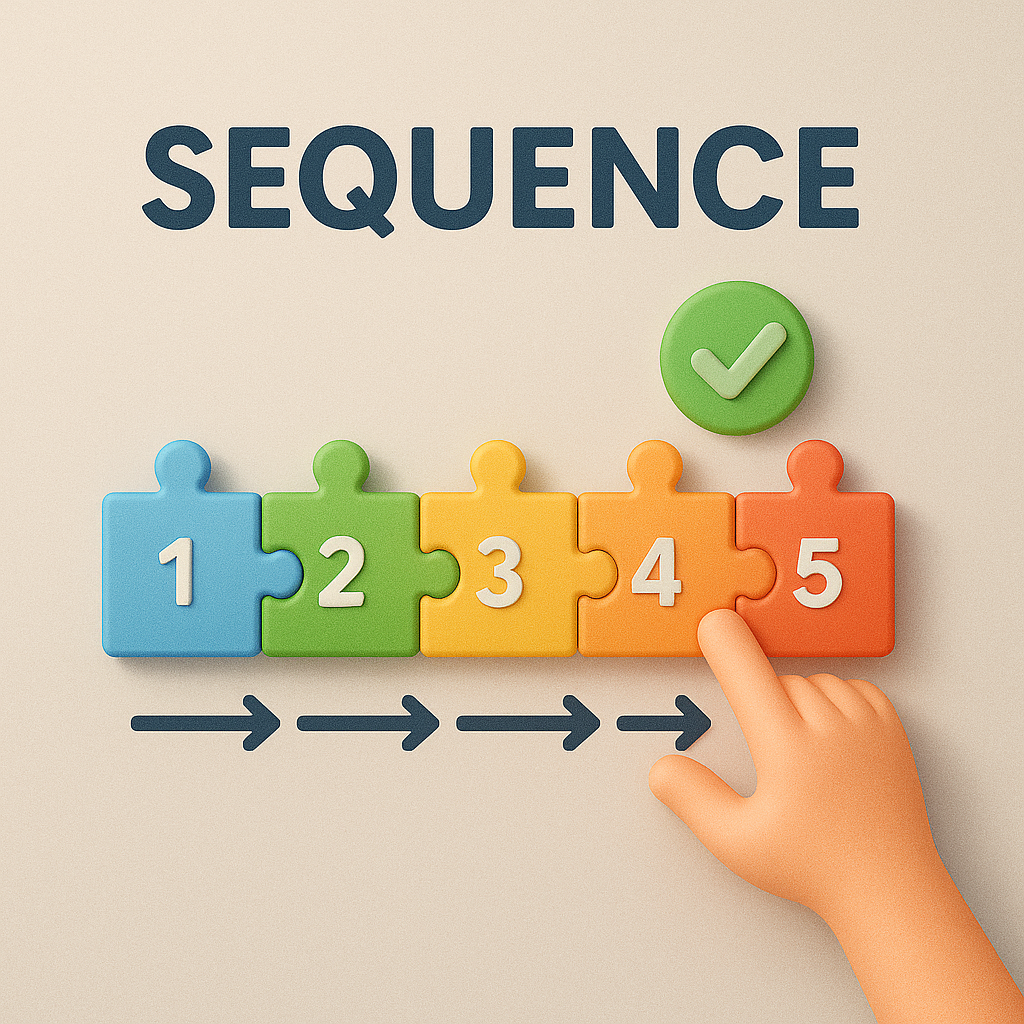Sequence
Definition
The word "sequence" can mean (1) an ordered set of related things, events, or numbers (noun); (2) a connected series of scenes in film or literature (noun); (3) the succession of one thing after another in time or logic (noun); or (4) to arrange or determine the order of something, especially genetic material (verb).
Parts of Speech
- Noun
- Verb
Pronunciation
American English
- IPA Pronunciation: /ˈsiːkwəns/
- Respelling: SEE‑kwənss
British English
- IPA Pronunciation: /ˈsiːkwəns/
- Respelling: SEE‑kwəns
Etymology
"Sequence" entered Middle English via Old French sequence, from Latin sequentia “that which follows,” derived from sequī “to follow.” The mathematical sense arose in the 17th century; the genetic‑analysis verb sense dates from the 1970s.
Derivatives
- Sequential (adjective)
- Sequencing (noun / present participle)
- Sequencer (noun)
- Subsequence (noun)
- Consequent (adjective / noun, related)
Synonyms
- Series
- Order
- Progression
- Chain
- Succession
Antonyms
- Randomness
- Disorder
- Chaos
- Disarray
Usage
"Sequence" is common in mathematics, computer science, genetics, film, and everyday speech. Examples: "The Fibonacci sequence begins 0, 1, 1, 2 …," "The opening action sequence was stunning," or "Technicians will sequence the viral genome."
Related Terms
- Algorithm: A set of rules for solving a problem step‑by‑step.
- Permutation: An arrangement of items in a particular order.
- Timeline: A graphical representation of a chronological sequence of events.
Detailed Definitions
Noun
- An ordered set of related items or events: Refers to things arranged by position, time, or logic.
- Example: "Follow the installation sequence to avoid errors."
- A connected series of scenes or shots in film or literature: Denotes a coherent narrative unit.
- Example: "The dream sequence foreshadows the protagonist’s fate."
- A succession of numbers following a specific rule (mathematics): Used to study convergence, patterns, and series.
- Example: "The arithmetic sequence 3, 6, 9, 12 … has a common difference of 3."
- The order of nucleotides or amino acids in a biomolecule (genetics): Provides the blueprint for biological function.
- Example: "Scientists compared the DNA sequence of two species."
Verb
- To arrange or place in a particular order: Implies deliberate organization or scheduling.
- Example: "The events were sequenced to maximize audience engagement."
- To determine or analyze the order of monomers in DNA, RNA, or protein: Refers to laboratory techniques in molecular biology.
- Example: "Researchers sequenced the pathogen’s genome within 24 hours."
sequence



🇨🇳 Mandarin
- 顺序 (shùnxù) - Sequence (order in which events follow)
- IPA: [ʂwən˥˩ ɕy˥˩]
- Respelling: shun-shue
- 序列 (xùliè) - Sequence (order of nucleotides in DNA/RNA)
- IPA: [ɕy˥˩ leɪ˥˥]
- Respelling: shue-lay
🇮🇳 Hindi
- क्रम (kram) - Sequence (order in which events follow)
- IPA: [kɾəm]
- Respelling: k-ram
- अनुक्रमणिका (anukramanika) - Sequence (order of nucleotides in DNA/RNA)
- IPA: [ənʊkɾəmaːniːkaː]
- Respelling: a-nu-kra-ma-ni-ka
🇪🇸 Spanish
- Secuencia - Sequence (order in which events follow)
- IPA: [seˈkwensja]
- Respelling: se-kwen-sya
- Secuenciación - Sequence (order of nucleotides in DNA/RNA)
- IPA: [sekwenθjaˈθjon]
- Respelling: se-kwen-sya-thjon
🇫🇷 French
- Séquence - Sequence (order in which events follow)
- IPA: [sekɑ̃s]
- Respelling: sek-ans
- Séquençage - Sequence (order of nucleotides in DNA/RNA)
- IPA: [sekɑ̃saʒ]
- Respelling: sek-ans-azh
🇦🇪 Modern Standard Arabic
- تسلسل (tasalsul) - Sequence (order in which events follow)
- IPA: [tæsælˈsul]
- Respelling: ta-sal-sul
- تسلسل النيوكليوتيدات (tasalsul alnayukliwatidat) - Sequence (order of nucleotides in DNA/RNA)
- IPA: [tæsælˈsul ʔælnæjukliːwaːtiːdæt]
- Respelling: ta-sal-sul al-na-yu-kli-wa-ti-dat
🇧🇩 Bengali
- ধারাবাহিকতা (Dharabahikata) - Sequence (order in which events follow)
- IPA: [d̪ʱaraːbait̪a]
- Respelling: dha-ra-bai-ta
- নিউক্লিওটাইডের ক্রম (Niukli'otaidēr krōm) - Sequence (order of nucleotides in DNA/RNA)
- IPA: [niukliːoʈaɪd̪er krom]
- Respelling: niu-kli-o-tai-der krom
🇷🇺 Russian
- Последовательность (Posledovatel'nost') - Sequence (order in which events follow)
- IPA: [pɐslʲɪdəvɐˈtʲelʲnəsʲtʲ]
- Respelling: pos-le-do-va-tel'-nost'
- Секвенирование (Sekvenirovanie) - Sequence (order of nucleotides in DNA/RNA)
- IPA: [sʲɪkvʲɪnʲɪˈrovənʲɪje]
- Respelling: sek-ve-ni-ro-va-ni-ye
🇵🇹 Portuguese
- Sequência - Sequence (order in which events follow)
- IPA: [sɨˈkẽsiɐ]
- Respelling: se-ken-si-a
- Sequenciamento - Sequence (order of nucleotides in DNA/RNA)
- IPA: [sɨkẽsiɐˈmẽtu]
- Respelling: se-ken-si-a-men-tu
🇮🇩 Indonesian
- Urutan - Sequence (order in which events follow)
- IPA: [ʊrʊtan]
- Respelling: u-ru-tan
- Sekuensing - Sequence (order of nucleotides in DNA/RNA)
- IPA: [sɛkʷɛnsɪŋ]
- Respelling: se-kwen-sing
🇩🇪 German
- Reihenfolge - Sequence (order in which events follow)
- IPA: [ˈʁaɪ̯ənˌfɔlgə]
- Respelling: rai-en-fol-ge
- Sequenzierung - Sequence (order of nucleotides in DNA/RNA)
- IPA: [zeˈkvɛnt͡siːʁʊŋ]
- Respelling: ze-kven-tsi-rung
🇯🇵 Japanese
- 順序 (Junjo) - Sequence (order in which events follow)
- IPA: [d͡ʑɯ̟̃ːd͡ʑo]
- Respelling: jun-jo
- シーケンス (Shīkensu) - Sequence (order of nucleotides in DNA/RNA)
- IPA: [ɕiːkẽɴsɯ]
- Respelling: shi-kensu
🇻🇳 Vietnamese
- Trình tự - Sequence (order in which events follow)
- IPA: [ʈɪŋ tɨ˧˩]
- Respelling: trinh tu
- Chuỗi - Sequence (order of nucleotides in DNA/RNA)
- IPA: [cɨwəj˧˩˧]
- Respelling: chuoi
🇰🇷 Korean
- 순서 (Sunseo) - Sequence (order in which events follow)
- IPA: [sʰun.sʰʌ]
- Respelling: sun-seo
- 시퀀스 (sikeunseu) - Sequence (order of nucleotides in DNA/RNA)
- IPA: [ɕʰikʰɯnsʰɯ]
- Respelling: si-khun-seu
🇹🇷 Turkish
- Sıralama - Sequence (order in which events follow)
- IPA: [sɯɾaˈɫama]
- Respelling: si-ra-la-ma
- Sekans - Sequence (order of nucleotides in DNA/RNA)
- IPA: [seˈkans]
- Respelling: se-kans
🇵🇰 Urdu
- ترتیب (Tarteeb) - Sequence (order in which events follow)
- IPA: [t̪ər.t̪iːb]
- Respelling: tar-tee-b
- تسلسل (Tasalsul) - Sequence (order of nucleotides in DNA/RNA)
- IPA: [t̪ə.sal.sʊl]
- Respelling: ta-sal-sul





